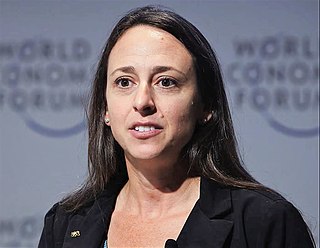Related Research Articles

The University of California, San Francisco (UCSF) is a public land-grant research university in San Francisco, California. It is part of the University of California system and is dedicated entirely to health science and life science. It conducts research and teaching in medical and biological sciences.

Mark Elliot Zuckerberg is an American business magnate, computer programmer, internet entrepreneur, and philanthropist. He co-founded the social media service Facebook and its parent company Meta Platforms, of which he is executive chairman, chief executive officer and controlling shareholder.

Nicholas B. Dirks is an American academic and the former Chancellor of the University of California, Berkeley. Dirks is the author of numerous books on South Asian history and culture, primarily concerned with the impact of British colonial rule. In June 2020, Dirks was named president and CEO of The New York Academy of Sciences.
Eva Harris is a professor in the School of Public Health at the University of California, Berkeley, and the founder and president of the Sustainable Sciences Institute. She focuses her research efforts on combating diseases that primarily afflict people in developing nations.
Shana O. Kelley is a scientist and Neena B. Schwartz Professor of Chemistry and Biomedical Engineering at Northwestern University. She is affiliated with Northwestern's International Institute for Nanotechnology and was previously part of the University of Toronto's Faculty of Pharmacy and Faculty of Medicine. Kelley's research includes the development of new technologies for clinical diagnostics and drug delivery. In 2023, she was chosen as president of Chicago's new Chan Zuckerberg Biohub.
Irva Hertz-Picciotto, is an environmental epidemiologist best known for her studies of autism. She is Professor and Chief, Division of Environmental and Occupational Health, Department of Public Health Sciences, at the University of California, Davis (UC-Davis). In addition, she is on the Research Faculty of the MIND Institute at UC-Davis; is Deputy Director of the UC-Davis Center for Children's Environmental Health; and is on the faculty of the Center for Occupational and Environmental Health of the Universities of California at Berkeley, Davis, and San Francisco. Hertz-Picciotto serves on the advisory board of the anti-toxic chemical NGO Healthy Child, Healthy World.

Lucy Shapiro is an American developmental biologist. She is a professor of Developmental Biology at the Stanford University School of Medicine. She is the Virginia and D.K. Ludwig Professor of Cancer Research and the director of the Beckman Center for Molecular and Genetic Medicine.

Sandra Louise Schmid is the first Chief Scientific Officer of the Chan-Zuckerberg Biohub. She is a Canadian cell biologist by training; prior to her move to CZI, she was Professor and Chair of the Cell Biology Department at the University of Texas Southwestern Medical Center. Throughout her academic career, she has authored over 105 publications on the molecular mechanism and regulation of clathrin-mediated endocytosis and the structure and function of the GTPase dynamin and mechanisms governing membrane fission. She was the first to identify dynamin's key role in endocytosis. She is a co-founder of the journal Traffic and has been the Editor-in-Chief of Molecular Biology of the Cell, and the President of the American Society for Cell Biology.

The Chan Zuckerberg Initiative (CZI) is an organization established and owned by Facebook founder Mark Zuckerberg and his wife Priscilla Chan with an investment of 99 percent of the couple's wealth from their Facebook shares over their lifetime. The CZI is set up as a limited liability company (LLC) and is an example of philanthrocapitalism. CZI has been deemed likely to be "one of the most well-funded philanthropies in human history". Its creation was announced on 1 December 2015, for the birth of their daughter, Maxima Chan Zuckerberg. Priscilla Chan has said that her background as a child of immigrant refugees and experience as a teacher and pediatrician for vulnerable children influences how she approaches the philanthropy's work in science, education, immigration reform, housing, criminal justice, and other local issues.
Chan Zuckerberg Biohub, or simply Biohub, is a nonprofit research organization. In addition to supporting and conducting original research, CZ Biohub acts as a hub and fosters science collaboration between UC Berkeley, UC San Francisco (UCSF) and Stanford. The Biohub’s medical science research center is funded by a $600 million contribution from Facebook CEO and founder Mark Zuckerberg and his wife Priscilla Chan. It is currently co-led by Stephen Quake and Joseph DeRisi. Gajus Worthington was named as Biohub's Chief Operating Officer in 2017 and Sandra Schmid joined as Chief Scientific Officer in 2020.
The Harvard Center for Population and Development Studies (HCPDS) is an interdisciplinary center at Harvard University, affiliated with the Harvard T.H. Chan School of Public Health.
Alexander Marson is an American biologist and infectious disease doctor, specializing in genetics, human immunology, and CRISPR genome engineering. He is the Director of the Gladstone-UCSF Institute of Genomic Immunology, and a tenured Professor with a dual appointment in the Department of Medicine and the Department of Microbiology & Immunology at the University of California, San Francisco (UCSF).

Laura Ann Waller is a computer scientist and Ted Van Duzer Endowed Associate Professor at the University of California, Berkeley. She was awarded a Chan Zuckerberg Initiative Fellowship to develop microscopes to image deep structures within the brain in 2017 and won the 2018 SPIE Early Career Award.
Tanja Kortemme is a bioengineering professor at University of California, San Francisco. She has been recognized for outstanding contributions in computational protein design, including energy functions, sampling algorithms, and molecules to rewire cellular control circuits. She was an inaugural Chan Zuckerberg Biohub investigator and was inducted into American Institute for Medical and Biological Engineering College of Fellows.

Jennifer (Jen) Dionne is an American scientist and pioneer of nanophotonics. She is currently senior associate vice provost of research platforms at Stanford University, a Chan Zuckerberg Biohub Investigator, and an associate professor of materials science and engineering and by courtesy, of radiology. She serves as director of the Department of Energy's "Photonics at Thermodynamic Limits" Energy Frontier Research Center (EFRC), which strives to create thermodynamic engines driven by light, and she leads the "Extreme Scale Characterization" efforts of the DOE's Q-NEXT Quantum Science Center. She is also an associate editor of the ACS journal Nano Letters. Dionne's research develops optical methods to observe and control chemical and biological processes as they unfold with nanometer scale resolution, emphasizing critical challenges in global health and sustainability.
Lisa Gunaydin is an American neuroscientist and assistant professor at the Weill Institute for Neurosciences at the University of California San Francisco. Gunaydin helped discover optogenetics in the lab of Karl Deisseroth and now uses this technique in combination with neural and behavioral recordings to probe the neural circuits underlying emotional behaviors.

Amy Elizabeth Herr is the John D. and Catherine T. MacArthur Professor at the University of California, Berkeley, where she is attached to the Department of Bioengineering. At Berkeley she was also the founding executive director of the Bakar Bioenginuity Hub. Herr is a Chan Zuckerberg BioHub Investigator and the Chief Technology Officer of the Chan Zuckerberg Biohub Network, a fellow of both the National Academy of Inventors and the American Institute of Medical and Biological Engineering, as well as a co-founder of Zephyrus Biosciences, a biotechnology company that was acquired by Bio-Techne.
Katherine Snowden Pollard is the Director of the Gladstone Institute of Data Science and Biotechnology and a professor at the University of California, San Francisco (UCSF). She is a Chan Zuckerberg Biohub Investigator. She was awarded Fellowship of the International Society for Computational Biology in 2020 and the American Institute for Medical and Biological Engineering in 2021 for outstanding contributions to computational biology and bioinformatics.

Peter J. Turnbaugh is a microbiologist and a professor at University of California, San Francisco. He is known for his research on the metabolic activities performed by the trillions of microbes that colonize humans' adult bodies. Turnbaugh and his research group use interdisciplinary approaches in preclinical models and human cohorts to study the mechanisms through which the gut microbiome influences nutrition and pharmacology.
Aaron Michael Streets is an African American bioengineer and assistant professor in the Department of Engineering at the University of California, Berkeley in Berkeley, California. He is the principal investigator at the Streets Lab, where he and his team use tools from mathematics, physics, and engineering to study biology. Streets is currently developing microfluidic technology for single-cell measurements due to its high-resolution imaging.
References
- ↑ "Jennifer Ahern – Society for Epidemiologic Research" . Retrieved 2022-02-15.
- ↑ "Jennifer Ahern awarded major NIH grant to study the effects of community violence on maternal and infant health". UC Berkeley Public Health. 2020-03-05. Retrieved 2022-02-15.
- ↑ "Jennifer Ahern PhD, MPH - UC Berkeley Public Health Faculty". UC Berkeley Public Health. Retrieved 2022-02-15.
- ↑ "Executive Committee – Society for Epidemiologic Research" . Retrieved 2022-02-15.
- ↑ "Jennifer Ahern, Ziad Obermeyer named Chan Zuckerberg Biohub Investigators". UC Berkeley Public Health. 2022-01-13. Retrieved 2022-02-15.